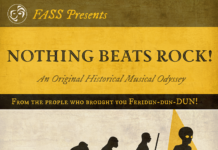When I was in elementary and high school, I was enrolled in the Catholic school system. If you’re familiar with the teachings of Catholicism as they relate to sex, it should come as no surprise that I had little-to-no education on the topic.
We had this thing called “Fully Alive,” which was a combination of social studies, religion, and one hilarious chapter on the male and female body. I say hilarious because as soon as we received our Fully Alive textbooks, we would turn to the page that had the diagrams of the human bodies and would absolutely freak out. We would lose our minds, laughing or cringing, depending on the detail of the diagram. The only thing I remember learning about sex in elementary school was “when men and women hold each other in a special way, a baby is made.” I learned more about the process of a baby turning from cells to fetus than I did about my own body or about sex.
High school wasn’t much better. I had a health class as a part of my physical education requirement. I was frightened by the knowledge of STDs and STIs, and I finally found out what a period was. I also learned a little bit more about my body. However, I got my period at age 11 – three years before I even had health class. My mom told me about my period when I got it, but she didn’t tell me why I got it or what caused it. I was in the dark for most of my young life about what my body did, and even when I had a better idea, I still was not as informed as I should have been.
My parents were good parents. They raised me to make good choices, but they are very religious. Sex was taboo in my environment because you’re not supposed to have sex until marriage in an overwhelming portion of Christian denominations. It’s a big deal. And yet, I feel I should have learned more from my parents about it for when I get married. I still need to know what happens if I am going to do it, or else I might end up in a situation I don’t want to be in.
I got a better sex education in about two months on the Internet than I ever got from the Catholic school system or from my family. This is not a good thing. I should have been taught by people I trust, people who care for me and look out for dangerous knowledge that could frighten or harm me if I was to end up in a sexual encounter. I didn’t learn about rape, consent, or bodily autonomy until I was in Grade 12, and (again) that was also from the Internet. What if something had happened to me before then? What would I have done?
I have some really smart friends – conventionally smart, textbook-smart friends. They make so many good choices in their lives. And yet, I know that some of them still have unprotected/unsafe sex. These friends have had a similar sex-ed experience to me – having been taught that abstinence, or waiting until marriage, is the only option. Then comes the Internet. I have so many friends who think the “pull-out” method is an appropriate form of contraception. These same friends wonder why they have UTIs, STIs, and pregnancy scares. These same friends think an abortion won’t be a scary thing if they have to get it, so they take risks. Some of my friends don’t even think unsafe sex is a risk.
I think that having sex-ed in schools is extremely important, especially for younger children. They don’t need to be learning about how to have sex when they are six years old, but they should be learning about their bodies and being aware of changes that will happen or about their autonomy. Children need to be taught to say no and be respected for it. They need to be taught that they are allowed to refuse things that make them uncomfortable – unless it’s eating their vegetables and taking a bath, of course. They need this education just like I needed it.
Sex-ed is also important for teens since they are most likely to have deliberate sexual encounters. Many people in my high school were having sex and there were several pregnancies that they were not ready for. The abstinence-only education made sex seem like it was forbidden, and that is one thing that most teenagers like, doing things that they shouldn’t be doing. In my experience, if you tell people not to do something instead of telling them how to do it safely, it still happens, but in a dangerous setting. This goes for drinking, drugs, abortion, and sex. If teenagers are taught what sex is about, and why it is important to be safe, fewer people will end up in situations they don’t want to be in.
There are some people, such as the candidates running for leadership of the Ontario Progressive Conservative Party, who intend to repeal or replace the current sex-ed curriculum. Sure, it is not perfect, but it is leagues ahead of how it was when I was in elementary and high school. I wished I had the opportunity to learn more from my school than I did about these things. My parents, though well wishing, should have told me more, too. If sex-ed becomes a standard in the curriculum, everyone gains a basic knowledge about sex and their bodies. If the school doesn’t teach young people, they will find out what they want to know on the Internet. They might get lucky like me and make smart choices based on what they find, or they might find some dangerous explicit porn or misinformation about sex. We need a standard, and I think Ontario has taken steps to ensure that today’s youth are learning in a safe environment.
Sunny Fleming
4A English Literature and Rhetoric































